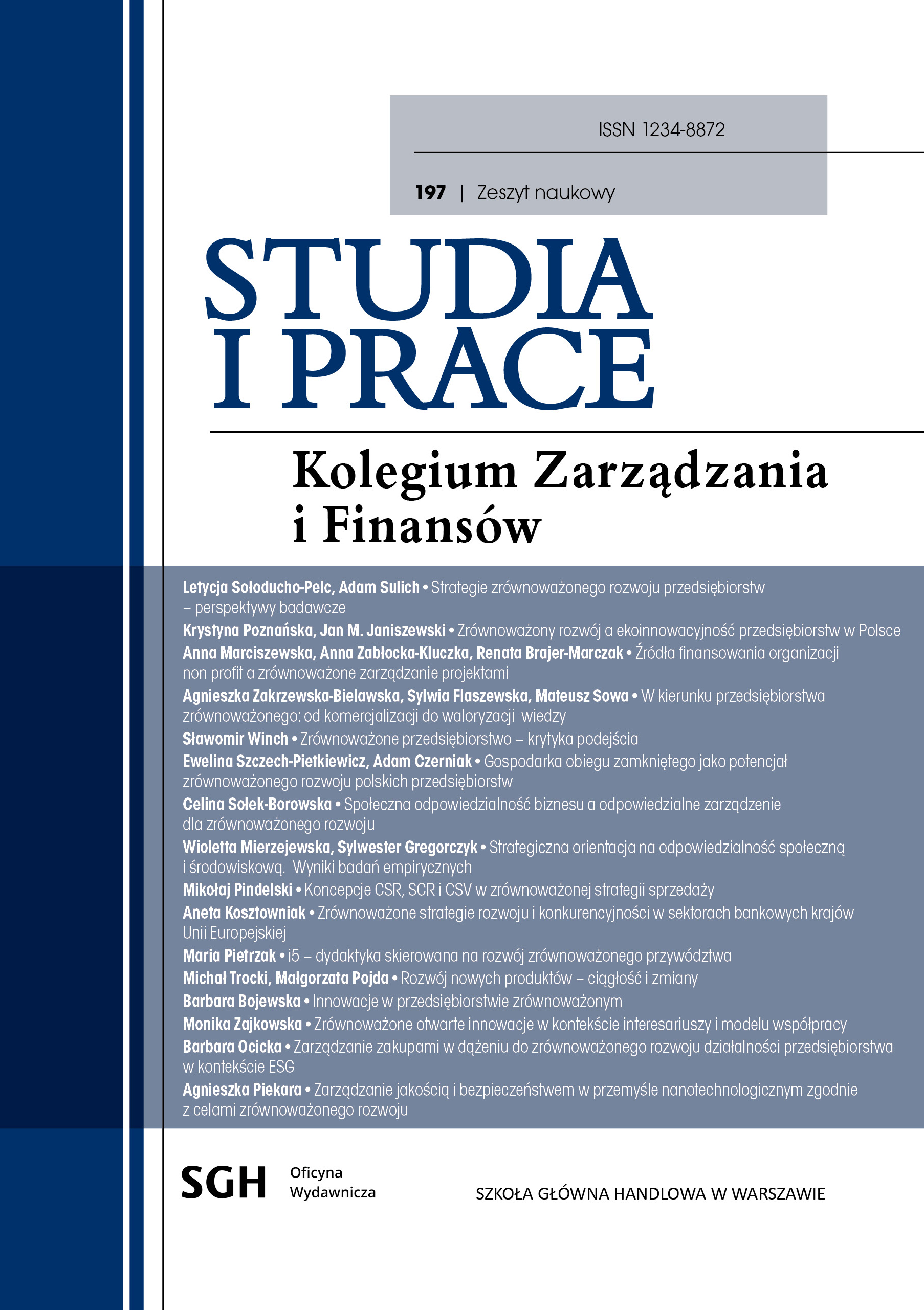Sustainable development strategies of enterprises: research perspectives
DOI:
https://doi.org/10.33119/SIP.2024.197.1Keywords:
eco-innovation, strategic coherence, sustainable development, sustainable strategic managementAbstract
Despite rapid progress in both the field of sustainable development and strategic management, knowledge about what sustainable development strategies are is not widespread. This translates into a need for closer collaboration between science and business, and thus, theory and practice. This defined research gap is accompanied by the research question: what the research perspectives are in the area of corporate sustainable development strategies. The aim of this article is to present the current state of knowledge and identify research perspectives in the area of corporate sustainable development strategies. The exploration of keywords through a systematic literature review enabled the integration of scientific evidence presenting the essence of sustainable development strategies. Meanwhile, combining classic and systematic literature reviews improved the quality of the research presented. Corporate sustainable development strategies are implemented in various functional areas of companies, therefore, they relate to sustainable development in different ways and with varying intensity. As a result of the research procedure conducted, it was determined that new promising research directions are previously unexplored areas within the innovations related to corporate sustainable development strategies. One of such business-social innovations could be green jobs, created as a result of financial investments and appropriate managerial decisions.
Downloads
References
Wydawnictwa zwarte
Bernard, Y., Coli, J.‑C. (1994). Słownik ekonomiczny i finansowy. Wrocław: Wydawnictwo Książnica.
Bojewska, B. (2009). Zarządzanie innowacjami jako źródło przedsiębiorczości małych i średnich przedsiębiorstw w Polsce. Warszawa: Oficyna Wydawnicza SGH.
Bojewska, B. (2015). Innowacyjność organizacji sieciowych w gospodarce opartej na wiedzy. Warszawa: Oficyna Wydawnicza SGH.
Dowgiałło, Z., Budziński, R., Dudziński, J., Ferenc, J., Henzel, H., Jarosz, A., Kieżun, W., Krawiec, B., Kulikowski, R., Łaguna, M., Olejniiczak, W., Pszczołowski, T., Znaniecka, K., Zeliaś, A. (red.). (2004). Nowy słownik ekonomiczny przedsiębiorcy. Szczecin: Wydawnictwo Znicz.
Dziewiański, J., Pietrzyk-Sokulska, E., Sokołowski, T., Wecławk, S., Sroczyński, W., Migała, J., Skrzypczak, R. (red.). (1993). Encyklopedyczny słownik sozologiczny (ochrony środowiska). Kraków: Polska Akademia Nauk Centrum Podstawowych Problemów Gospodarki Surowcami Mineralnymi i Energią.
Glinka, B., Hensel, P. G. (2017). What should be avoided during qualitative research? Qualitative Methodologies in Organization Studies (Vol. 2). Springer International Publishing. DOI: 10.1007/978-3-319-65442-3_11.
Hensel, P. G. (2020). Systematyczny przegląd literatury w naukach o zarządzaniu i jakości. Warszawa: Wydawnictwo Naukowe Wydziału Zarządzania Uniwersytetu Warszawskiego. DOI: 10.7172/978–83-66282-19–3.2020.wwz.2.
Łabno, G. (2010). Ekologia. Słownik encyklopedyczny. Poznań: Wydawnictwo Ibis. 9. Pasieczny, L., Gliński, B., Kieżun, W., Koźmiński, A., Kulikowski, J., Kurnal, J., Kwiatkowski, S., Mreła, H., Ostapczuk, B., Trzcieniecki, J. (red.). (1981). Encyklopedia Organizacji i Zarządzania. Warszawa: Państwowe Wydawnictwo Ekonomiczne.
Pszczołowski, T. (1978). Mała encyklopedia prakseologii i teorii organizacji. Wrocław: Wydawnictwo Zakład Narodowy im. Ossolińskich.
Artykuły naukowe
Baas, J., Schotten, M., Plume, A., Côté, G., Karimi, R. (2020). Scopus as a curated, high-quality bibliometric data source for academic research in quantitative science studies, Quantitative Science Studies, 1 (1), s. 377–386. DOI: 10.1162/qss_a_00019.
Bojewska, B. (2005). Kultura organizacyjna a strategia przedsiębiorstwa, Handel Wewnętrzny, 4–5, s. 7–13.
Hensel, P. G. (2021). Reproducibility and replicability crisis: How management compares to psychology and economics – A systematic review of literature, European Management Journal, 39 (5), s. 577–594. DOI: 10.1016/j.emj.2021.01.002.
Janikowska, O., Kulczycka, J. (2021). Just transition as a tool for preventing energy poverty among women in mining areas – a case study of the Silesia region, Poland, Energies, 14 (12). DOI: 10.3390/en14123372.
Meissner, P., Wulf, T. (2015). The development of strategy scenarios based on prospective hindsight: An approach to strategic decision making, Journal of Strategy and Management, 8 (2), s. 176–190. DOI: 10.1108/JSMA-01-2015-0004.
Netzel, P., Slopek, J. (2021). Comparison of different implementations of a raster map calculator, Computers & Geosciences, 154, 104824. DOI: 10.1016/j.cageo.2021.104824.
Orłowska, A., Mazur, Z., Łaguna, M. (2017). Systematyczny przegląd literatury: Na czym polega i czym różni się od innych przeglądów, Ogrody Nauk i Sztuk, 7, s. 350–363. DOI: 10.15503/ onis2017.350.363.
Sołoducho-Pelc, L., Sulich, A. (2020). Between Sustainable and Temporary Competitive Advantages in the Unstable Business Environment, Sustainability, 12 (21), s. 1–16. DOI: 10.3390/su12218832.
Sulich, A., Sołoducho-Pelc, L. (2022). Changes in Energy Sector Strategies: A Literature Review, Energies, 15 (19), 7068. DOI: 10.3390/en15197068.
Sulich, A., Zema, T. (2023). Green energy transition in Germany: A bibliometric study, Forum Scientiae Oeconomia, 11 (2), s. 175–195. DOI: 10.23762/FSO_VOL11_NO2_9.
Warwas, I., Podgórniak-Krzykacz, A., Przywojska, J., Kozar, Ł. (2021). Going green and socially responsible – textile industry in transition to sustainability and a circular economy, Fibres and Textiles in Eastern Europe, 29 (3), s. 8–18. DOI: 10.5604/01.3001.0014.7782.
Zema, T., Sulich, A. (2022). Models of Electricity Price Forecasting: Bibliometric Research, Energies, 15 (15), s. 1–18. DOI: 10.3390/en15155642.
Downloads
Published
How to Cite
Issue
Section
License
Copyright (c) 2024 Studies and Work of the Collegium of Management and Finance

This work is licensed under a Creative Commons Attribution 4.0 International License.









